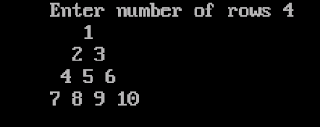
Firstly we will take a for loop(outer) for 4 rows.In the outer for loop we need 3 for loops(spaces,i...2*i-1,2*i-1...i)
Print spaces
For every ith row , print n-i spaces.
Print numbers i....2*i-1
For every ith row , print numbers from i to 2*i-1.
Print numbers 2*i-1....i
For every ith row , print numbers from 2*i-1 to i.#include<stdio.h>
int main()
{
int i,j,k;
for(i=1;i<=4;i++)
{
for(j=i;j<4;j++)
printf(" ");
j = 2*i-1;
for(k=i;k<=j;k++)
printf("%d",k);
for(k=j-1;k>=i;k--)
printf("%d",k);
printf("\n");
}
return 0;
}



















